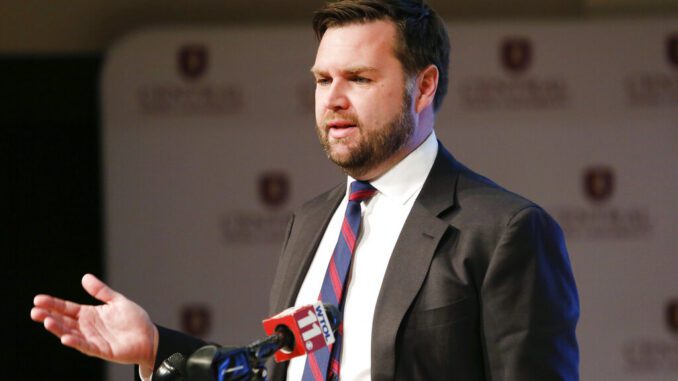
COLUMBUS, Ohio — Former President Donald Trump on Friday endorsed “Hillbilly Elegy” author JD Vance in Ohio’s bitterly competitive Republican Senate primary, ending months of jockeying in a race where his backing could be pivotal.
In a statement, Trump described Vance as “the candidate most qualified and ready to win in November.”
“It is all about winning!” he wrote.
The decision marks a major blow for Vance’s top rivals — former state treasurer Josh Mandel, investment banker Mike Gibbons and former Ohio Republican Party chair Jane Timken — who have been locked in a heated and contentious race for both the nomination and Trump’s backing in a primary that is now less than three weeks away.
On Thursday night, dozens of Republican leaders in Ohio mounted a last-minute effort to urge Trump not to endorse Vance following a news report that said Trump had made a decision.
While Trump lost his reelection campaign in 2020 after two impeachments, he remains deeply popular with the GOP base, including in Ohio, a state he won twice. While Gibbons and Mandel had been leading in recent polls, strategists in the state had long conceded that the former president’s support would likely push his pick to the front of the pack in a race that has revolved, to a large extent, around him.
In addition to making frequent trips to Mar-a-Lago, echoing his election integrity, and hiring a coterie of former Trump aides, the candidates and their affiliated super PACs have also spent millions trying to present themselves to voters as Trump’s favored option and paint one another as insufficiently loyal to the former president.
Vance, in particular, has come under fire for old audio and since-deleted tweets in which he called himself a “never-Trump guy,” called Trump an idiot, and said he might have to hold his nose and vote for Democrat Hillary Clinton in 2016.
But the author, venture capitalist and Marine veteran has since changed his tune, saying he regretted his past comments. In the race, he has closely aligned himself with the former president, making frequent appearances on Fox News and former Trump strategist Steve Bannon’s podcast, where he has echoed Trump’s rhetoric on issues including trade and immigration.
Trump, in his statement, acknowledged that Vance “may have said some not so great things about me in the past.” But he said that Vance, with whom he has been in frequent touch, “gets it now, and I have seen that in spades.”
Trump also referenced the other candidates who have gone to extreme lengths to win his backing. “This is not an easy endorsement for me to make because I like and respect some of the other candidates in the race—they’ve said great things about ‘Trump,'” he wrote, while calling on his supporters to unite behind Vance.
Trump had told allies this week that he had settled on Vance, according to two people familiar with his thinking who spoke on condition of anonymity to discuss private conversations, and moved forward despite a desperate, last minute effort to change his mind by rivals and some party leaders.
While Trump had long been worried about Vance’s standing in the polls, he decided, in the end, that Vance was the candidate best positioned to take on U.S. Rep Tim Ryan, the Democratic frontrunner, whom he expects to be an especially tough competitor this fall. Trump, an avid TV viewer, also felt Vance presented best on television and was particularly impressed with his performance during the candidates’ last debate. He was equally turned off by what one person described as the “debate debacles” between Mandel and Gibbons, in which the two men nearly came to blows during an earlier face-off.
In addition to their own rapport, Vance also had the backing of Trump’s eldest son, Donald Trump Jr., Fox News host Tucker Carlson and others who had advocated on his behalf.
In an interview earlier this week, Vance told talk radio host Hugh Hewitt that he wasn’t sure whether Trump would end up endorsing in the race, but thought if he did it would come before Trump returns to the state for an April 23 rally.
“He wants to endorse the person he thinks can beat Tim Ryan,” Vance said.
The endorsement is the second long-awaited nod that Trump has made this week as primary elections draw near. Last Saturday, he backed Mehmet Oz in Pennsylvania’s May 17 Republican primary, months after his first endorsed candidate, Sean Parnell, withdrew amid allegations of abuse from his estranged wife.
In Ohio, the candidates had long prepared for the possibility that Trump, torn between candidates, might choose to sit out the race entirely or, perhaps endorse more than one person to avoid deciding.
But even those he passed by continued to align themselves with Trump on Friday.
Mandel, in a tweet, said he would “continue to be a proud supporter of President Trump and the America First agenda” and looked look forward to earning his endorsement in the general election, while Timken, in a statement, called the decision “disappointing,” even as she continue to tout Trump’s past endorsement for state party chair.
Meanwhile, State Sen. Matt Dolan, the only major candidate in the race who did not aggressively court Trump, accused his rivals of having “embraced lies and undermined the Constitution to go all-in for one endorsement.”
“They cheapened their candidacies and the integrity of the office they wish to attain with campaigns that are now in chaos as ballots are being cast,” he said.
The winner of the May 3 primary is likely to face Tim Ryan in November for the seat being vacated by retiring Republican Sen. Rob Portman. ___ Colvin reported from New York. Associated Press writer Meg Kinnard in Roanoke Rapids, N.C. contributed to this report.



